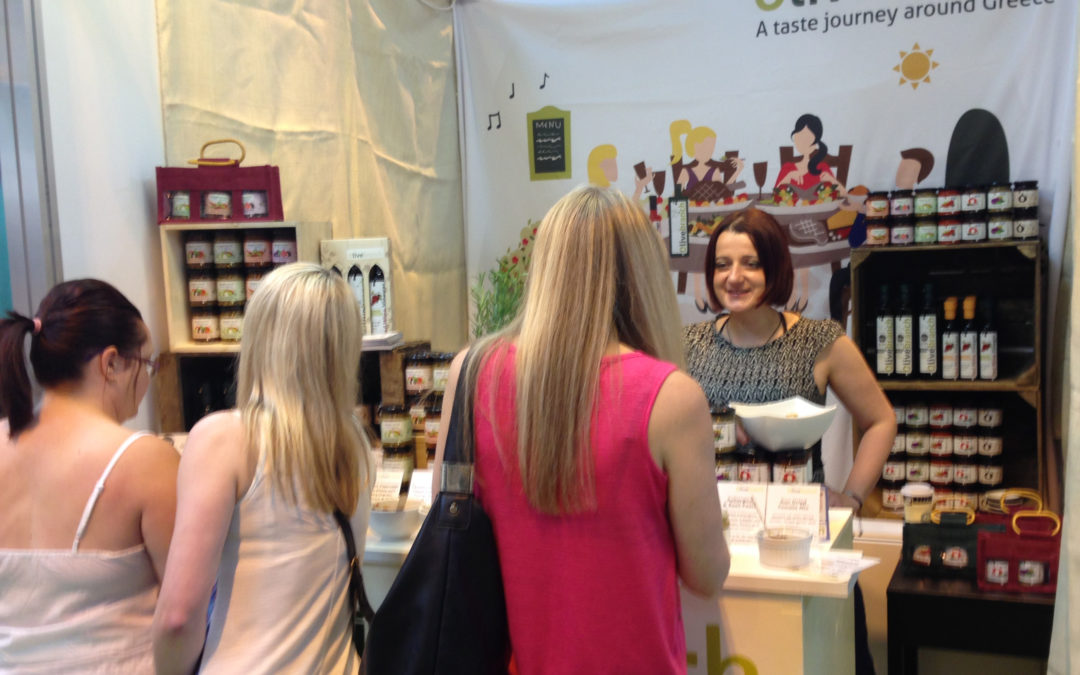Last week we were exhibiting at the BBC Good Food Summer Show at the Birmingham NEC. We take part in lots of shows around the country as it is very important for us to engage directly with the public to showcase our brand and get feedback on our products. This time round, we launched our new Chunky Olive Tapenade and the highlight of the show was seeing so many people claiming they don’t like olives, adventurously tasting our tapenade and going on to buy a jar (or two)!
Whilst at the show, we found ourselves being visited by lots of customers interested to know more about Olive Oil. We were naturally pleased and happy to share our knowledge! As we engaged in conversations, many were most interested to know if Olive Oil is suitable for cooking with or not – we were surprised at how many times we were getting asked about this that we began to ask the visitors what was triggering their questioning. They told us that they had just been talking to rapeseed oil companies who had told them “you can’t cook with olive oil.”
Usually at these big consumer shows we are very busy on our own stand but this time, we decided to make time to go around and see the rapeseed oil producers. We were quite surprised in their promotion tactics. We could see that they were promoting things like ‘Extra Virgin Rapeseed Oil’ and ‘First Cold Pressed’ – terms that are customary in the Olive Oil world. We’re not too familiar with the Rapeseed Oil industry so we decided to carry out some research to see what these terms mean for another type of Oil and what similarities they share with our familiar Oil – to be frank we were extremely surprised with the findings.
Here are some of our findings:
Cold Pressed – Almost all the products we saw were describing their Oil as ‘Cold Pressed.’ in the Olive Oil industry, there is a European directive which states that cold pressing must occur at below 27 degrees. We are unable to find any information on what cold pressed means for the Rapeseed Oil industry and what regulation governs it. Moreover, we have found several websites stating that Rapeseed is pressed at 40 degrees for Oil extraction. 40 degrees doesn’t sound cold to us! The reason why Olive Oil is cold pressed is to retain the nutrients, the vitamins and antioxidants
Cooking with Olive Oil – Many producers has big messages stating ‘Olive Oil not suitable for cooking.’ We almost fell over when we saw this. You only have to look at the Mediterranean kitchen and its centuries of history to see that cooking with Olive Oil is perfectly fine to cook with. Or you can turn on the TV and watch one of the hundreds of celebrity chefs who adorn our screens and see whether they cook with Olive Oil or not. If you’re looking for a professional chef that doesn’t cook with Olive Oil, you might find yourself searching for a long time. The real truth about cooking with Olive Oil is that it isn’t as suitable for high intense heat cooking – an eloquent way of describing frying. The reason is that it has a lower smoke point which means that it is not as effective for reaching the high temperatures required for deep frying as other Oils. So in a nutshell, what they’re really trying to say with their marketing message ‘Olive Oil not suitable for cooking’ is ‘Olive Oil not suitable for frying your chips.’ If this is the message that is being portrayed, it is also important to point out that frying destroys the most of the vitamins in food (vegetables, fish, etc) and in Oil as well. It’s a very unhealthy way to cook food – which we’re sure you all know already!
Extra Virgin – Most of the producers on show were describing their Rapeseed Oil as Extra Virgin Rapeseed Oil. In the Olive Oil sector, Extra Virgin refers to the classification of the Oil. Oils are classified according to their ‘acidity’ whereby to be Extra Virgin, it must be from the first cold pressing of the Olive and it must have a volume of acid per 100ml of less than 0.8%. We began to research what Extra Virgin means for Rapeseed Oil and we came across an excellent article from Judy Ridgway. Judy is one of the world’s leading authorities on Olive Oil and is held in very high respect by producers from all Olive Oil producing countries. She is in fact from Britain and we found a very interesting article from her. Click here to read the full article. She has carried out her own survey to find out exactly what ‘Extra Virgin’ means in Rapeseed Oil by calling and emailing 20 British producers. She struggled to find a consistent response. People know that Extra Virgin is the highest quality in Olive Oil, so of course they would believe the same if this terms is applied to Rapeseed Oil. The problem is that no-one knows what the term truly means for Rapeseed Oil, not even the producers themselves.
Our intention with this article is not to cause a rivalry between the different Oil sectors. All we want to do is to play a role in educating the public on the truth in their products, so they can make informed decisions themselves, without being misled by nonfactual claims.

